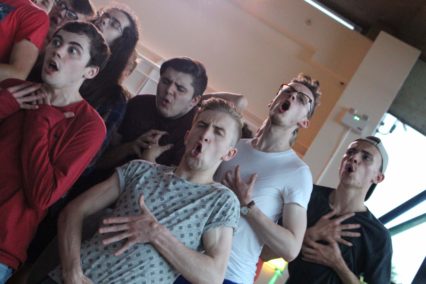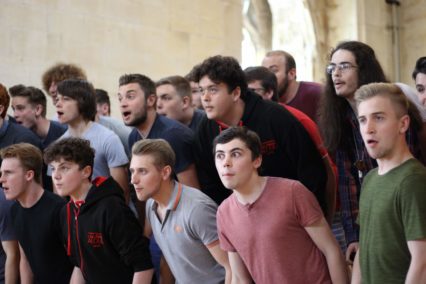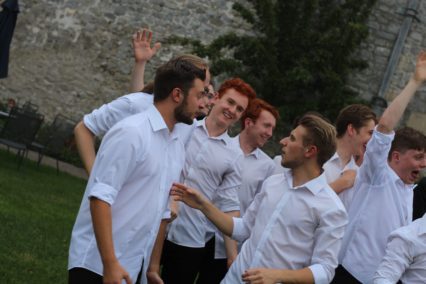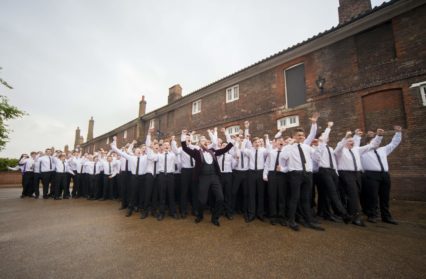Cath Barton gets an insight into the Principality Only Boys Aloud Academi 2017.
When I heard that Only Boys Aloud were going to be performing a new commission from top contemporary composer Mark-Anthony Turnage in July*, I was intrigued to hear more from their founder and Artistic Director Tim Rhys-Evans.
Tim, who also founded the hugely-successful Only Men Aloud back in 2000, tells me that the bringing together of 144 boys to join the men on stage to sing at the opening of the National Eisteddfod in Ebbw Vale in 2010 was intended as a one-off to see if there was an appetite amongst boys to sing. That turned out to be the beginning of an organisation, the Aloud charity, which now gives teenage boys across Wales the chance to sing regularly in a choir. There are currently 14 Only Boys Aloud groups, from Aberdare to Wrexham, open to all boys aged 13 to 19, with no auditions and no fees.
 Tim emphasises that the focus in these groups is on inclusion and participation. Boys are never asked to sing on their own unless they want to do so. The other side of the opportunities that Only Boys Aloud offers is that boys can get unrealistic expectations, and Tim is very clear that it is irresponsible to lead all boys to think that they can have a career in singing. There are, however, some boys in the groups who have the potential to do this very thing. For them the Principality Only Boys Aloud Academi offers coaching to develop their skills during an annual one-week course, taking place this year at Atlantic College on the South Wales coast, during the first week of July. On one day during the week the group will head to North Wales to sing in the Llangollen International Eisteddfod, and after the course will give concerts in Cardiff and London.
Tim emphasises that the focus in these groups is on inclusion and participation. Boys are never asked to sing on their own unless they want to do so. The other side of the opportunities that Only Boys Aloud offers is that boys can get unrealistic expectations, and Tim is very clear that it is irresponsible to lead all boys to think that they can have a career in singing. There are, however, some boys in the groups who have the potential to do this very thing. For them the Principality Only Boys Aloud Academi offers coaching to develop their skills during an annual one-week course, taking place this year at Atlantic College on the South Wales coast, during the first week of July. On one day during the week the group will head to North Wales to sing in the Llangollen International Eisteddfod, and after the course will give concerts in Cardiff and London.
Any boy who is a member of one of the Only Boys Aloud choirs, aged 16 plus and with an 80% attendance rate can audition for the annual Academi and if successful will be asked to raise £200 towards the £1,200 cost to Aloud of his place on the week. Tim says that this is a sum that most boys will be able to raise – though no-one will be turned down if not – and that doing this helps them to appreciate the value of what the course offers them. Importance is attached to preparation for the auditions, including turning up on time and looking smart, because the work of the Aloud charity is about teaching boys life skills. Boys are given a detailed critique after they audition, with the emphasis being placed on making the whole experience relevant and positive.
While the regular weekly choirs are focussed on piquing an interest in singing, with a repertoire which is centred on pop and music theatre, with nothing too esoteric, the Academi is about development of musical skills and pushing the boys who take part in it to excellence. Boys will be at different levels. That, in Tim’s view, is not an issue. The important thing, he feels, is that every boy feels he has grown musically by the end of the week. His passion is clear as he talks about musical education. The pressures of the national curriculum mean that musical notation is no longer taught in schools and we have, he says, created an elitist musical society accessible only to those young people whose parents can afford it. The Aloud charity is doing its bit to redress the balance –
during the Academi week the boys work on musicianship in streamed sets and also all have individual singing lessons in addition to the full group sessions.
 As for repertoire, boys at the 2017 Academi will be singing a huge variety. Tim says it’s the most diverse programme they’ve tackled so far. He is particularly excited about their commission from leading British avant-garde composer Mark-Anthony Turnage. I asked him how it came about. It was serendipitous – he was at a party where he met Turnage, he tells me, and quite simply felt emboldened to ask him if he would consider writing a piece for the Academi boys. To his delight Turnage said yes. While he is the composer who, Tim tells me, is at the top of his wishlist of contemporary British composers to commission, he is simply not on the radar of most of the Aloud boys. For Only Boys Aloud to have Turnage write for them is, says Tim, “such a privilege.” He is thrilled by the composer’s response, not just in taking on the commission, but in engaging with it so enthusiastically – he will be coming down to Atlantic College for a couple of days towards the end of the Academi week, and will sit in on rehearsals and “hang out with the lads.”
As for repertoire, boys at the 2017 Academi will be singing a huge variety. Tim says it’s the most diverse programme they’ve tackled so far. He is particularly excited about their commission from leading British avant-garde composer Mark-Anthony Turnage. I asked him how it came about. It was serendipitous – he was at a party where he met Turnage, he tells me, and quite simply felt emboldened to ask him if he would consider writing a piece for the Academi boys. To his delight Turnage said yes. While he is the composer who, Tim tells me, is at the top of his wishlist of contemporary British composers to commission, he is simply not on the radar of most of the Aloud boys. For Only Boys Aloud to have Turnage write for them is, says Tim, “such a privilege.” He is thrilled by the composer’s response, not just in taking on the commission, but in engaging with it so enthusiastically – he will be coming down to Atlantic College for a couple of days towards the end of the Academi week, and will sit in on rehearsals and “hang out with the lads.”
Turnage’s commission, Sing Out Loud, commemorates the hundredth anniversary of the WW1 battle of Passchendaele, setting words by Owen Sheers and Dylan Thomas. Alongside it the boys will be working on works by Randall Thompson, Josquin des Pres, Mendelssohn and other composers in the classical tradition, but much more besides. Included are pieces from two contemporary musicals, one of them, Everybody’s Talking About Jamie, about a boy who wants to go to a school prom in a dress. Tim feels that it’s important to celebrate diversity in this way when, as he points out, “a lot of the boys aren’t sure where they fit in yet.”
The concert programmes also have an international flavour. Including a piece in Kenyan and an Islamic prayer in Urdu is in no way tokenistic. Tim explains that he feels that it is “a responsibility in this very scary time”, when difference is something we are suspicious of. He says that a lot of the boys who come to Only Boys Aloud are naive about other ways of life, although the Aloud teachers don’t presume to tell them how to respond to different cultures. But it certainly sounds as if they open their ears to them. I’m keen to hear more and readily accept Tim’s invitation to go down to Atlantic College for a morning and listen in on rehearsals.
I arrive while the boys are auditioning – in front of the whole group – for solo roles in some of the choral pieces they are going to be performing. Their individual song choices range from music theatre pieces to English art song, from French opera to Italian Arie Antiche. It’s evident that there is as wide a range of experience amongst the boys, yet all receive equal support and appreciation from their peers. The group has clearly gelled in the four days they’ve been together.
 When they break for coffee Tim introduces me to Jonathan Butterell, who is directing the course for the fifth year running. He tells me that he makes a point of keeping the Academi week free in his busy annual schedule, so important does he consider it and so much does he enjoy it. As a theatre director Jonathan is obviously looking forward to working with the boys on the staging of their songs. For now, though, there’s a full group rehearsal in which Tim is running through some of the songs which the group will be singing in Llangollen the following day. Before they sing an arrangement of the Irish folk song The Rocky Road to Dublin, he asks them: “If you were me, what would you be worried about in this song?” They immediately come up with answers about not speeding up and the need to get the words across clearly. Tim takes every opportunity to engage the boys fully. In another song with driving motor rhythms and syncopations, he gets the boys to dance about as they sing, before returning to stillness but harnessing that kinetic energy in their voices.
When they break for coffee Tim introduces me to Jonathan Butterell, who is directing the course for the fifth year running. He tells me that he makes a point of keeping the Academi week free in his busy annual schedule, so important does he consider it and so much does he enjoy it. As a theatre director Jonathan is obviously looking forward to working with the boys on the staging of their songs. For now, though, there’s a full group rehearsal in which Tim is running through some of the songs which the group will be singing in Llangollen the following day. Before they sing an arrangement of the Irish folk song The Rocky Road to Dublin, he asks them: “If you were me, what would you be worried about in this song?” They immediately come up with answers about not speeding up and the need to get the words across clearly. Tim takes every opportunity to engage the boys fully. In another song with driving motor rhythms and syncopations, he gets the boys to dance about as they sing, before returning to stillness but harnessing that kinetic energy in their voices.
There’s no time wasted. For half an hour before lunch the boys work on music theory in groups. This is an intensive week and I see from a timetable pinned to the wall that rehearsals don’t end till 10pm tonight, though there is free time at the end of the afternoon and a swimming pool available. I get a chance to chat briefly to some of the boys. One says what hard work it is, but “definitely worth it.” For some it’s their first Academi. Others who have been before comment on how it’s helped them develop. Over lunch I chat to an 18 year old who started singing at the age of 14 when he joined an Only Boys Aloud group. This is his third year at the Academi and he says that the best thing about it is that it takes him out of his comfort zone. He’s off to University next year, studying to be an actor, and feels that having been to the Academi will really help him with that.
There’s a strong sense of focus, commitment and maturity amongst this group. The 35 boys on the course this year are all clearly making the most of the Academi week. I’m sure that that’s going to lead to performances at the end of the course which will be joyful for both them as singers and their audiences. But more importantly than that, it’s going to help turn them from boys into men.
*The Principality Only Boys Aloud Academi 2017 are in concert at:
Dora Stoutzker Hall, Royal Welsh College of Music and Drama, Cardiff, at 7.30pm on Monday 10 July, and Wigmore Hall, London, at 12.00pm on Wednesday 19 July.



 Enjoyed this article? Support our writers directly by buying them a coffee and clicking this link.
Enjoyed this article? Support our writers directly by buying them a coffee and clicking this link.








